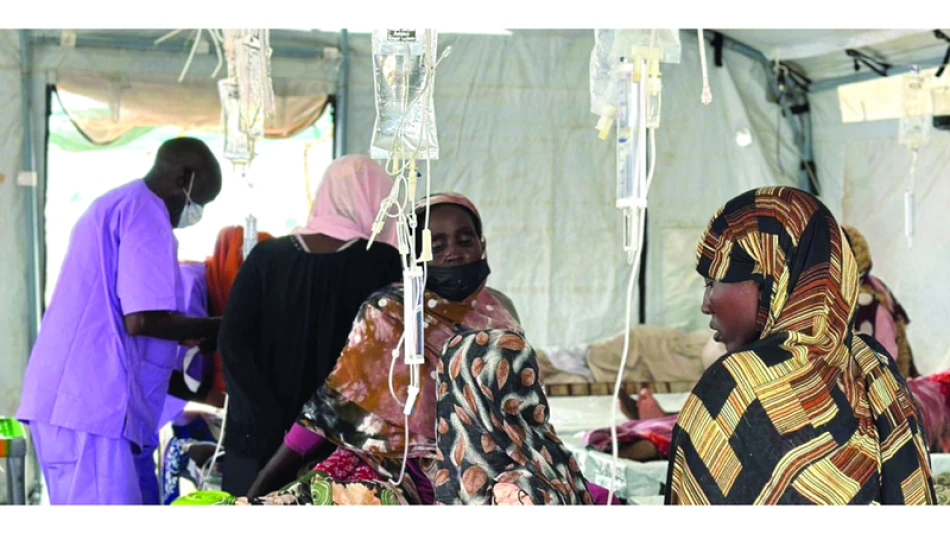
Africa Braces for Cholera Outbreak as Rainy Season Looms
Africa's Cholera Crisis Deepens as Death Rates Climb and Rainy Season Looms
Africa faces an escalating cholera emergency that extends far beyond the rising number of affected countries—the disease is becoming deadlier. With 23 nations now reporting cases and death rates climbing from 1.9% to 2.1% among the 205,000 recorded infections this year, the continent confronts a perfect storm of inadequate infrastructure, vaccine shortages, and conflict-driven displacement that threatens to spiral further out of control.
A Crisis That Hits the Most Vulnerable First
The Africa Centers for Disease Control and Prevention's latest briefing reveals troubling trends that mirror historical patterns of cholera outbreaks targeting society's most defenseless populations. The waterborne bacterial infection, spread primarily through contaminated water sources, causes severe watery diarrhea that can lead to fatal dehydration within hours if untreated.
The disease disproportionately affects impoverished communities living in overcrowded conditions without access to clean drinking water—from urban slums in major cities to neglected rural areas. These populations often suffer from malnutrition and weakened immune systems, creating ideal conditions for cholera to spread rapidly and claim lives.
Infrastructure Failures Drive the Epidemic
The stark reality of Africa's sanitation crisis becomes clear when examining specific countries. In South Sudan, one of the worst-affected nations, only 16% of the population has access to proper sanitation facilities. Sudan fares slightly better but still leaves 65% of its population without clean water access—a devastating gap that transforms every rainfall into a potential health catastrophe.
The Africa CDC has sharply criticized chronic underinvestment in sanitation infrastructure, identifying it as the root cause of cholera's expanding footprint. This systemic failure means that when heavy rains arrive in West and Central Africa, sewage inevitably contaminates wells and rivers that serve as primary water sources for millions.
Vaccine Shortage Creates Dangerous Gap
Africa CDC Director-General Jean Kaseya recently highlighted a critical supply shortage that exemplifies the global health equity divide. The continent requires 54 million cholera vaccine doses annually, yet only half that amount is available—a gap Kaseya called "unacceptable" during meetings with African leaders.
This vaccine shortage reflects broader patterns seen in other health crises, where African nations struggle to secure adequate supplies of life-saving interventions. Unlike wealthier regions that can stockpile vaccines or rapidly scale production, African countries remain dependent on international manufacturers and donor funding that often falls short of actual needs.
Conflict Zones Become Cholera Hotspots
The situation reaches catastrophic levels in conflict-affected areas where violence prevents relief workers from accessing vulnerable populations. Eastern Congo exemplifies this deadly combination, with millions fleeing attacks by various militias while living in conditions ripe for disease transmission.
Sudan's Perfect Storm
Sudan represents perhaps the most alarming case study. Since April 2023, a brutal power struggle has displaced over 12 million people, creating massive refugee populations with minimal access to healthcare or sanitation. North Darfur state now teeters on the brink of famine, according to UN warnings, with 4,300 cholera cases already recorded.
In the town of Tawila, North Darfur, approximately 370,000 people fled after attacks on the Zamzam refugee camp. Relief workers report catastrophic health conditions, with residents lacking toilets, clean water, and medical care. One displaced resident named Samir captured the desperation: "People are dying because they are too weak to survive. People sleep in the streets, without tents or shelter from the rain, and the rainy season has just begun. The situation will get worse."
The logistics of delivering aid compound these challenges. Relief supplies to Tawila can only arrive from neighboring Chad—a journey taking several days, assuming militias don't confiscate shipments at numerous roadblocks. Once the rainy season intensifies, roads through the Jebel Marra mountain range become impassable for weeks.
Healthcare Systems Under Siege
In states like Darfur, South Kordofan, and Blue Nile, 80% of hospitals have closed while more than 60% of water treatment plants have stopped functioning. This collapse of basic infrastructure makes effective crisis response nearly impossible, according to Action Against Hunger.
The Democratic Republic of Congo has already recorded nearly 1,000 cholera deaths. Dr. Maximilian Gertler, a tropical medicine specialist from Berlin's Charité Hospital, recently worked with Doctors Without Borders in Congo's Tshopo province, where cholera erupted in March. He witnessed "unreasonably high" mortality rates of 20-30% in the outbreak's early stages before relief teams intervened.
Success Stories Highlight What's Possible
Gertler's experience also demonstrates that effective cholera response can dramatically reduce death rates. After relief teams arrived with proper supplies and treatment protocols, mortality dropped rapidly to below 1%. However, even basic supplies like water purification tablets had to be transported via Congo's river system due to poor road infrastructure.
This success story underscores that proven strategies exist to combat cholera—the challenge lies in securing funding for vaccines and improving sanitation conditions before outbreaks occur.
International Funding Retreat Threatens Future Response
The crisis occurs against a backdrop of shrinking international development assistance. Gertler noted the impact of the U.S. government's suspension of USAID operations, telling German news agency DPA: "Now we can clearly see that partners who previously funded such projects are leaving. What awaits people will probably only become clear in the coming months."
This funding retreat comes precisely when Africa needs sustained investment in preventive infrastructure rather than reactive emergency response. The cholera crisis exposes fundamental weaknesses in global health security that extend far beyond any single disease outbreak.
As the rainy season intensifies across West and Central Africa, UNICEF warns that over 80,000 children face heightened cholera risk. Without urgent action to address infrastructure gaps, vaccine shortages, and conflict-driven displacement, Africa's cholera crisis threatens to become an endemic feature rather than an emergency to be resolved.
Most Viewed News

 Sara Khaled
Sara Khaled






